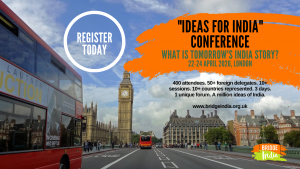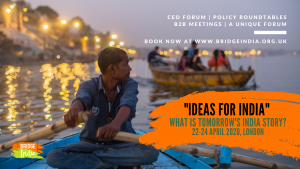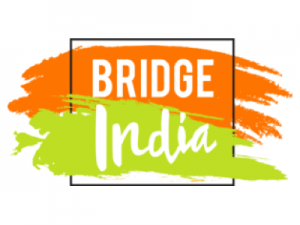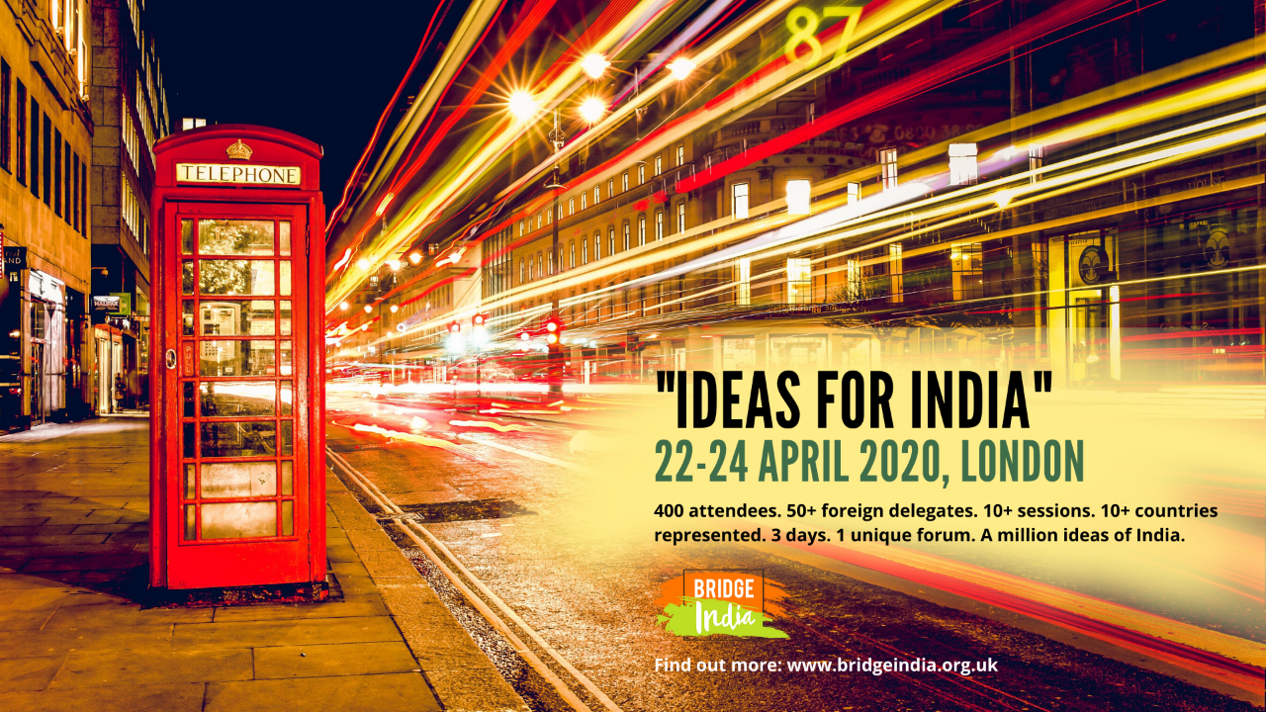The future of India comes to London when non-profit think tank Bridge India showcases its premier conference ‘Ideas for India’ from the 22-24 April 2020 in the UK’s capital. The event promises to bring together business, policy and NRI leaders from the UK, India, Europe, and further afield to discuss the next wave of India’s growth as an economy and a nation.
“Bridge India is just over a year old at this stage, and while we’ve averaged two to three events a month, they have been smaller and more intimate. Now we feel we have enough awareness in the market to go bigger and start an annual event of this scale,” said Supriyo Chaudhuri, Trustee of Bridge India.
“Given its diversity, everything about India, and it’s polar opposite, is true in unison. We at Bridge India seek to highlight and celebrate this nuance, to help India-watchers understand India better through the Ideas for India conference. We have two simple objectives; to bring value to every single attendee in the room, and burnish a reputation for being a platform that brings together a melting pot of different views that help India-watchers understand India better,” Supriyo mentioned.
Ideas for the future
The three-day-long conference is expected to have over 400 attendees with over 50 foreign delegates representing over ten countries. Conversations, debates, and networking events chaired by a group of highly acclaimed professionals, policy makers, and academia will be spread over three days and 12 sessions.
 Day one will start in a fitting venue at the British Houses of Parliament, day two will be focused on parallel business and policy dialogue sessions; while day three, with an all-day business conference, will end with an invite-only black-tie dinner.
Day one will start in a fitting venue at the British Houses of Parliament, day two will be focused on parallel business and policy dialogue sessions; while day three, with an all-day business conference, will end with an invite-only black-tie dinner.
“We are aiming for representation from around a dozen countries during the event, including countries where the India opportunity is not well-recognised or understood, such as in Central and Eastern Europe,” said Pratik Dattani, Managing Director of Economic and Strategy Consulting at EPG and advisor to Bridge India.
“We feel that the ‘India Story’ abroad, including in these events, is often presented through a narrow lens, be it focusing only on business and the economy, society or policy landscape. The vast majority of the diaspora across Europe are not engaged with these bilateral engagements, and often there is an absence of a deep analysis of issues,” confirmed Pratik.
Talking points
The session topics have been meticulously planned, keeping this ethos in mind. The topics include:
- How attractive is India as an investment destination
- India’s energy security
- Fake news in India
- AI conclave
- Data privacy and security
- Exclusive breakfast briefings
- What is India’s position in the world
- What is your Idea of India
- Delivering for the bottom 90% of India

“The starting point for all our events is that no-one has a monopoly on good ideas. We seek to bring together opposite ends of the political, business, civil society, academic, and NRI spectrum,” Supriyo said.
This integrated rhetoric on India will be discussed by a group of prominent speakers from India and the UK, including Lord Karan Bilimoria (President, Confederation of British Industry), Mohandas Pai (Chairman, Manipal Global Education), Karan Thapar (TV news anchor), Nakul Saxena (Head of Policy, iSPIRT Foundation), Sitaram Yechury (General Secretary, CPI(M)), Abhinandan Sekhri (CEO, Newslaundry), Dinesh Dhamija MEP (Chair of India Caucus, European Parliament), Siddarth Zarabi (Executive Editor, Business Television India), and Nitin Mantri (President, ICCO).
The big focus will be to debate and discuss the big ideas that could drive India’s growth both as an economy and nation over the coming decades, says Bridge India team member Rohini Lakhani.
According to speaker Nakul Saxena, Director of Public Policy at iSPIRT Foundation, the nature of growth in India is changing. Capital and access to the internet has disrupted business models in India, creating a virtuous cycle of growth for many of India’s tech startups.
India rebranded
“As India rebrands itself and evolves as an economy, technology, innovation, data privacy, and related topics will be at the heart of this growth. I’m delighted to be able to contribute to such ideas for India at this conference,” he said in a statement.
 From hearing diverse points of view, in a setting that embraces differences and allows intellectual thought, there is a concerted effort from the team to add value for each and every attendee. For example, before someone buys a ticket, every attendee is being asked to fill in this form which allows the team to understand which topics and themes they are most interested in.
From hearing diverse points of view, in a setting that embraces differences and allows intellectual thought, there is a concerted effort from the team to add value for each and every attendee. For example, before someone buys a ticket, every attendee is being asked to fill in this form which allows the team to understand which topics and themes they are most interested in.
“This helps us curate our content better,” said Supriyo. “We would not exclude anyone from coming simply on the basis of budgets. It’s equally important to have CEOs as it is students – who are tomorrow’s CEOs – in the room. Indeed, the reason why we started a Student Voices blog on our website is because several students from London universities got in touch with us to say that they are interested in publishing work on public policy, but think tanks and similar organisations tend not to accept their submissions.”
Cultivating debate
While supporting Indian students studying in the UK, Bridge India is keen to sound a call-to-action for NRIs abroad, when The Economist, The Guardian, Washington Post or think tanks such as Brookings or Chatham House publish work that is critical of India.
“It is debated and highlighted on every Indian prime-time TV news debate. But only the headlines are ever discussed, not the content. Now imagine the same amount of discourse for an Indian think tank, say, in Delhi publishing detailed research on aspects of the Indian economy. It just doesn’t happen. For better or worse, we don’t have a culture of nuanced public policy and economic research debate. We hope to cultivate that with Bridge India, an Indian-diaspora-led think tank,” said Pratik.
A lot of buzz has already been created around this inaugural event that will become an annual affair from here on. In a statement for the press, Pushparaj Deshpande, Director of the Samruddha Bharat Foundation said, the Indian diaspora has risen to the top of their professions globally and can contribute significantly to India’s growth as an economy as well as a heterogeneous democracy.
“I look forward to engaging in this unique forum to bring together leaders not just from India but globally, in a unique, diverse yet intimate forum.”
Further information is available at www.bridgeindia.org.uk/event/ideas-for-india-april-2020
For further information, email sanjana@bridgeindia.org.uk
About Bridge India
 Bridge India is a public policy think tank with its first office in London, and further European offices opening in 2020. They feel that the ‘India Story’ abroad is often presented through a narrow lens, be it focusing only on business and the economy, society or policy landscape. Given its diversity, everything about India, and its polar opposite, is true in unison. Bridge India seeks to highlight and celebrate this nuance, to help India-watchers understand India better.
Bridge India is a public policy think tank with its first office in London, and further European offices opening in 2020. They feel that the ‘India Story’ abroad is often presented through a narrow lens, be it focusing only on business and the economy, society or policy landscape. Given its diversity, everything about India, and its polar opposite, is true in unison. Bridge India seeks to highlight and celebrate this nuance, to help India-watchers understand India better.
Bridge India also set up reciprocal Memberships with chambers in Luxembourg and Ireland. They took a delegation to the 29th Economic Forum in Poland and held a pre- and post- Indian elections analysis with centre-right think tank the Henry Jackson Society. We hosted former RBI Governor Raghuram Rajan for two events in two days.
It is a registered charity with the Charity Commission in England & Wales (charity number 1183696). The organisation is funded exclusively through Individual and Corporate Memberships.
Smita is a multi-cultural freelance journalist, writer, and filmmaker based out of the US, London, Hong Kong, and India. Global Indian Stories is her brain-child. Created to chronicle diaspora stories written by Indians of all age groups, from different walks of life across the globe, Smita makes sure that the platform remains inclusive and positive.


![Powerful Pride documentary Legendary Children [All Of Them Queer] streaming very soon](https://globalindianstories.org/wp-content/uploads/2025/06/Legendary-streaming-release-featured-238x178.jpg)



![Powerful Pride documentary Legendary Children [All Of Them Queer] streaming very soon](https://globalindianstories.org/wp-content/uploads/2025/06/Legendary-streaming-release-featured-100x75.jpg)

